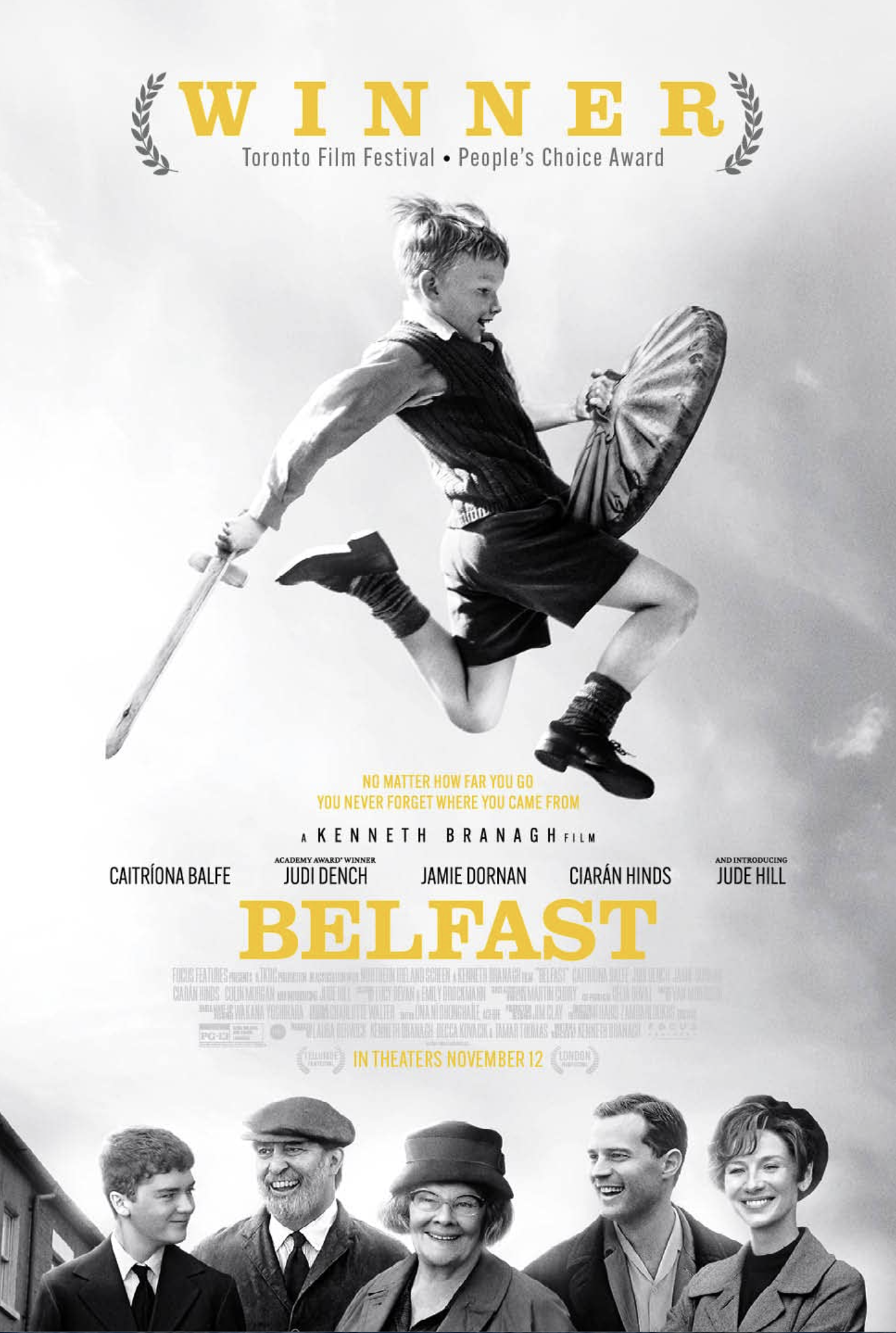It’s 1969 Belfast, Ireland. The heat of the “The Troubles,” a sectarian war between the Catholics and the Protestants of Northern Ireland, is in full gear and infiltrates the which idyllic blue collar neighborhood where Buddy (Jude Hill) and his brother Will (Lewis McAskie) and parents (Caitriona Balfe, Jamie Dornan) live. What appears to be a typical day instantly becomes a brutal one, filled with fear and violence. Buddy’s view of the world is forever changed in an instant and “Belfast” is his story seen through his eyes.
Written and directed by Kenneth Branagh, “Belfast” is a this semi-autobiographical story. He shares his memories, correct or not, these are his views painted in his childlike lens as Buddy, our main character, attempts to process the events, live a new normal life, and find a future. His grandparents (Judi Dench, Ciara Hinds) a strong presence in his life, weigh in on navigating these rough waters, protecting their children and grandchildren.
Buddy’s childlike processing of a new concept — categorization of people — is heartbreaking as he and Cousin Vanessa (Nessa Eriksson) discuss how to tell the difference between a Catholic and a Protestant by name alone. Equally disturbing and somehow also humorous is this little guy’s interpretation of Catholicism as viewed by a Protestant. The innocence imparted with his words brings clarity as Buddy attempts to make sense of the violence and danger surrounding him.
Ma and Pa struggle as Pa finds work in England, but it’s not home. Home is Ireland, but more specifically, Belfast and this tight-knit community. These changing times push this family to make decisions that will change them forever, but again, as Buddy’s childhood innocence is shattered, he focuses and holds on to the normalcy of being a kid — his crush in school is of particular focus — and the insular relationships within the neighborhood including his grandparents.
“Belfast” rings true no matter who you are or where you live. It’s a story of family and the bonds that are developed and embraced with the heart and soul seen through the eyes of a young boy. Buddy’s perception and interpretation of the events and consequences are heartbreakingly raw, but there’s a blurred hue that is superimposed on the events and that is from the love and resiliency he receives from Ma, Pa, Gran and Pops.
Branagh’s vision into his past beautifully imbued by black and white and frame-filling faces captures a myriad of emotions. Frequently, Branagh chooses to take us to Buddy’s level, seeing the world literally from his perspective. Gorgeously shot, “Belfast” takes possession of your heart, relating to your own childhood relationships, no matter how rose-colored we remember it all.
Branagh’s cast is a family, a family of actors who immediately create the intimacy of having spent years together. Belfe and Dornan delicately impart the push and pull of a typical married couple under extraordinary circumstances demonstrating confusion and sorrow as they make their sacrifices. Dench’s Gran portrayal hits home with her strength, wisdom, stoicism, wit, and never-ending love. Her final scene eviscerates you as you realize what she has done. Of course, the story balances on the innocence and authenticity of young Jude Hill who plays Buddy and this child shines brighter than any star in the sky. His brilliance is captured by the camera, but it is the genuine relationships he has cultivated among the adults that endears you to him. Never does it appear that he is acting. He lets us into his world and we see the devastation and the love through him.
“Belfast” may be Branagh’s best film to date as a love letter to Ireland, to Belfast, and to the roots that connect us to our friends and most importantly to our family.
4 Stars

